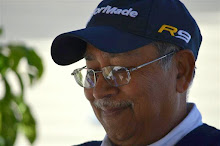Every human being carries within them an invisible boundary — a silent perimeter set not by society or law, but by the self. It is the subtle edge of the moral compass, unconsciously drawn through values, upbringing, and lived experience. We don’t always notice when we cross it — but when we do, even unknowingly, it often begins to haunt us in ways we never anticipated.
In the bustle of daily life, caught up in work, ambition, and survival, we often overlook the quiet needs of those around us. Our routines make us efficient, but not always empathetic. There may come a day when we give money to a stranger who is starving — a gesture of kindness — but in that moment, we might suddenly remember the time we ignored a friend in distress, or failed to support an ageing relative. The guilt that arises isn't about the current act of charity; it stems from a deeper regret — of having once missed a chance to care when it truly mattered.
Such moments of reflection don’t follow a schedule. They arrive uninvited, sometimes years later, triggered by something as simple as a street scene or a film. One such film, The Father, left a profound impact on me. Anthony Hopkins, in a hauntingly beautiful performance, portrays an elderly man slipping into the fog of dementia. His daughter, played by Olivia Colman, struggles to care for him — torn between love, exhaustion, and the hard realities of life. What the film so brilliantly captures is not just the disintegration of memory, but the quiet moral conflict of the caregiver. The guilt of not being able to do enough. The regret of losing patience. The ache of witnessing a loved one fade away, and the helplessness of watching yourself withdraw emotionally in response.
This story is not uncommon. Many aging parents, who once sacrificed everything for their children, now find themselves alone — sometimes placed in old age homes. The decision may be driven by practical constraints, but later, when life slows down, it can stir deep guilt. Memories return unbidden: of their silent sacrifices, the uncomplaining way they gave up comforts for our sake, the joy they felt in our smallest successes. And we wonder — could we not have done more?
These aren’t isolated emotions. They are shared by many who, in their earnest chase of personal goals, overlooked the human connections that truly mattered. Yet, guilt, for all its weight, is not entirely a curse. It is the soul’s way of nudging us toward reflection. It makes us human. It tells us that our conscience is still alive — tender, questioning, and capable of growth.
Conclusion
Life is noisy, and its demands never truly end. But somewhere between the appointments and obligations, we must pause to check in — not just with others, but with ourselves. The invisible boundary of our moral compass, though unseen, is felt. When we cross it, something inside us shifts. And while guilt may come later, like an echo from the past, it also offers a second chance — to reconnect, to redeem, and to realign.
Let us strive to be present, now — while there is still time. Let us not wait for regret to remind us of our humanity.


4 comments:
Past has passed away. Future is unknown. What is true is present. So let's make it purposeful and successful with our commitment and contribution. Heartiest congratulations. Kind regards
- हम में हर वक़्त ये एहसास बना रहे तो बेहतर है
- सोचे सारे काम अधूरे और मोहलत ज़रा सी है
Thanks dear Vijay for your comment!
A very sensitive subject.. brilliantly captured... 👍
Thanks dear Subhedar for your observation!
Post a Comment